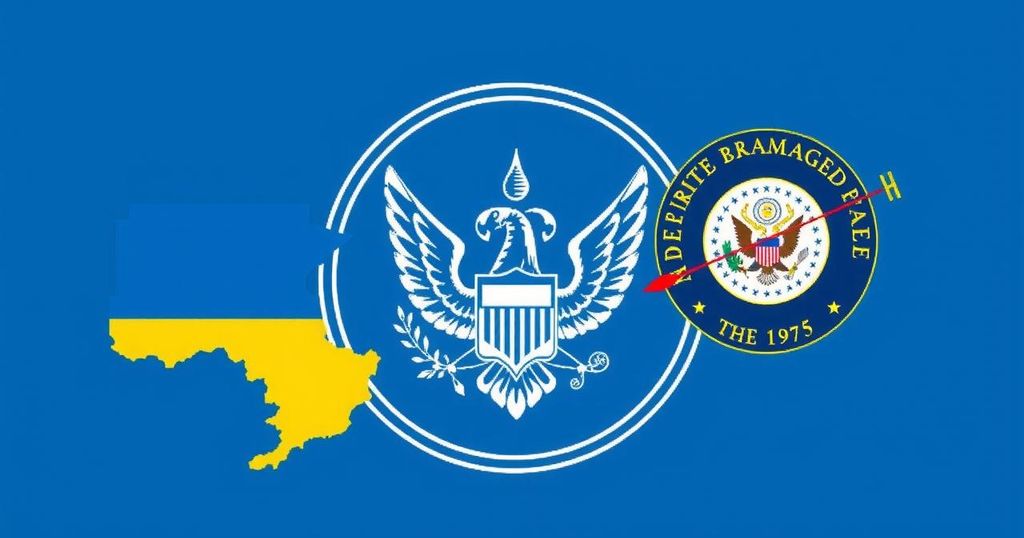U.S. Election Impact on NATO Leader Discussions Regarding Ukraine Aid

The impending U.S. presidential election raises concerns for NATO allies regarding the future of military aid to Ukraine. With potential changes in U.S. support should Donald Trump be elected, NATO is seeking to bolster European contributions to Ukraine’s security. Current military assessments indicate challenges for Ukraine as Russia continues to gain tactical advantages. Amid these developments, the centralization of control for military assistance has become a priority to ensure sustained support irrespective of U.S. involvement.
The forthcoming U.S. presidential election casts a significant shadow over NATO’s recent discussions regarding defense strategies and military aid to Ukraine. Officials from NATO are increasingly concerned about the potential for reduced U.S. support should Donald Trump return to the presidency. During a confidential meeting held last Thursday, U.S. Secretary of Defense Lloyd Austin acknowledged the uncertainty surrounding future U.S. assistance amidst ongoing questions from allied nations. He emphasized that, despite current bipartisan support for Ukraine in Congress, the trajectory for aid might shift based on the election results. Senior NATO officials expressed that they anticipate a decreased role for the U.S. in Ukrainian support, prompting calls for European nations to enhance their own defense capabilities. This apprehension is exacerbated by recent military developments, as Russia continues to make strategic advancements in Ukraine, outpacing the Ukrainian forces in artillery fire and overall military readiness as winter approaches. Simultaneously, President Biden has sustained a policy refraining from allowing Ukraine to utilize U.S.-provided long-range missiles against targets within Russia, a stance that has drawn dissent from several NATO allies who argue that such capabilities are critical for Ukraine’s success. In light of the uncertain future of U.S. military aid, NATO is taking steps to centralize control over the training and support of Ukrainian forces, thereby preparing for an eventuality where U.S. support diminishes under a Trump administration. Although this initiative known as the NATO Security Assistance and Training for Ukraine is still in development, the urgency for Europe to modularize and increase weapon production reflects a proactive measure to counterbalance any potential withdrawal of U.S. backing. Furthermore, the stasis in EU plans to secure long-term funding for Ukraine due to internal divisions, notably Hungary’s blockade, has created additional uncertainty for the nation’s military and reconstruction agenda. The U.S. government is concurrently working to ensure the sustainability of military aid to Ukraine by not only expending existing allocated funds but also investing significantly in Ukraine’s defense manufacturing capabilities. Recent assessments indicate that while NATO is ramping production of munitions, it is lagging far behind Russia, which maintains a substantial production capability bolstered by military resources from North Korea and Iran, among other nations. To secure allies’ confidence, Secretary Austin has reassured NATO partners of America’s dedication to maintaining a robust supply line of military aid to Ukraine. As such, NATO leadership remains adamant about fostering unity within the alliance, underscoring the notion that support for Ukraine transcends acts of charity, representing instead a mutual investment in global security. Thus, it can be seen that the implications of the U.S. presidential election as it relates to NATO discussions and aid to Ukraine is of paramount importance as the geopolitical landscape continues to evolve.
The article addresses the implications of the impending U.S. presidential election on NATO discussions concerning military aid to Ukraine amidst rising tensions with Russia. As NATO allies fear a decline in U.S. support should Donald Trump reclaim the presidency, they are reconsidering their strategies to bolster defense assistance independently. The ongoing conflict in Ukraine and the enhancements of military aid by adversaries such as North Korea, Iran, and China provide a critical backdrop for these discussions, highlighting the urgency for European nations to increase their capabilities to support Ukraine effectively in the face of potential reductions in American involvement.
In summary, the conversation around NATO’s future role in supporting Ukraine amidst the uncertainty surrounding the U.S. presidential election signifies a crucial turning point in international security dynamics. The potential alteration of American aid could compel NATO to adapt its strategies, emphasizing greater European responsibility. As military capabilities and production rates face formidable challenges, the upcoming election remains a pivotal factor in determining the course of Ukraine’s assistance and security in the years to come.
Original Source: www.cnn.com






